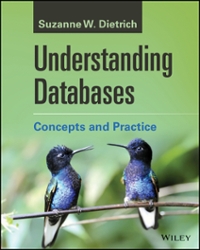Question
In this team-based homework, youll use any resources available to create the fastest sorting algorithm possible. Bonus points will go to the fastest algorithms! The
In this team-based homework, youll use any resources available to create the fastest sorting algorithm possible. Bonus points will go to the fastest algorithms!
The following files have been given to you:
1. A C++ header file (sort.h) declaring a sort function.
2. A C++ source file (main.cpp) containing a main function with tests.
The sorting algorithm in your submission can be based on any combination of sorting algorithms, but must contain references (as comments in sort.cpp) to algorithm resources used. Feel free to implement helper functions in sort.cpp
Here are some suggestions:
Focus on algorithms, not line-by-line optimization.
Dont sort if you dont have to, i.e. if the array is already sorted.
The best algorithm varies based on input; it may be worth first looking at the input (quickly) and picking an algorithm based on the contents.
Use online resources to see what algorithms are out there and what inputs they are good for. Many well-known algorithms, e.g. quick sort, have several variations
//MAIN.CPP
#include
using namespace std; using namespace chrono;
inline void _test(const char* expression, const char* file, int line) { cerr << "test(" << expression << ") failed in file " << file; cerr << ", line " << line << "." << endl; abort(); }
#define test(EXPRESSION) ((EXPRESSION) ? (void)0 : _test(#EXPRESSION, __FILE__, __LINE__))
// A basic sorting algorithm (merge sort) to compare // against your sorting algorithm for correctness and speed. void benchmark_sort(int* A, int n) { if (n < 2) return; int halfway = n/2; benchmark_sort(A, halfway); benchmark_sort(&(A[n/2]), n - halfway); int i, j, copied_elements; i = 0; j = halfway; copied_elements = 0; int* sorted_A = new int[n]; while (copied_elements < n) { if (j == n) { sorted_A[copied_elements] = A[i]; ++i; } else if (i == halfway) { sorted_A[copied_elements] = A[j]; ++j; } else if (A[i] < A[j]) { sorted_A[copied_elements] = A[i]; ++i; } else { sorted_A[copied_elements] = A[j]; ++j; } ++copied_elements; } for (int i = 0; i < n; ++i) A[i] = sorted_A[i]; delete[] sorted_A; }
int main() { srand(2017); // Initializes random number generation system_clock::time_point start, end; float dur;
// Variables used later const int n = 5000000; int* A = new int[n]; int* B = new int[n]; float total_duration = 0; float total_benchmark_duration = 0;
// Test 1: already in sorted order for (int i = 0; i < n; ++i) A[i] = B[i] = i+1;
start = system_clock::now(); sort(A, n); end = system_clock::now(); dur = duration
start = system_clock::now(); benchmark_sort(B, n); end = system_clock::now(); dur = duration
for (int i = 0; i < n; ++i) test(A[i] == B[i]);
// Test 2: reverse sorted order for (int i = 0; i < n; ++i) A[i] = n-i; for (int i = 0; i < n; ++i) B[i] = A[i];
start = system_clock::now(); sort(A, n); end = system_clock::now(); dur = duration
start = system_clock::now(); benchmark_sort(B, n); end = system_clock::now(); dur = duration
for (int i = 0; i < n; ++i) test(A[i] == B[i]);
// Test 3: in "mostly" sorted order for (int i = 0; i < n; ++i) A[i] = i+1; for (int i = 0; i < 10000; ++i) swap(A[rand() % n], A[rand() % n]); for (int i = 0; i < n; ++i) B[i] = A[i];
start = system_clock::now(); sort(A, n); end = system_clock::now(); dur = duration
start = system_clock::now(); benchmark_sort(B, n); end = system_clock::now(); dur = duration
for (int i = 0; i < n; ++i) test(A[i] == B[i]);
// Test 4: random ints for (int i = 0; i < n; ++i) A[i] = rand(); for (int i = 0; i < n; ++i) B[i] = A[i]; start = system_clock::now(); sort(A, n); end = system_clock::now(); dur = duration
start = system_clock::now(); benchmark_sort(B, n); end = system_clock::now(); dur = duration
for (int i = 0; i < n; ++i) test(A[i] == B[i]);
// Test 5: lots of repeats for (int i = 0; i < n; ++i) A[i] = rand() % 10; for (int i = 0; i < n; ++i) B[i] = A[i];
start = system_clock::now(); sort(A, n); end = system_clock::now(); dur = duration
start = system_clock::now(); benchmark_sort(B, n); end = system_clock::now(); dur = duration
for (int i = 0; i < n; ++i) test(A[i] == B[i]);
// Summary stuff
// Print out the total time spent by your sort on all tests cout << "Total time: " << total_duration << " seconds." << endl;
// Check that you beat the benchmark (basic merge sort) test(total_duration < total_benchmark_duration); cout << "Assignment complete." << endl; }
//END MAIN.CPP
------------------------------------
//SORT.H
#ifndef SORT_H #define SORT_H
void sort(int* A, int len);
#endif
//END SORT.H
-----------------------------
Create a new C++ source file named "sort.cpp" that implements the function declared in sort.h, so that sort.cpp and the provided files compile into a program that runs with no failed tests and has a lowest displayed total time.
Step by Step Solution
There are 3 Steps involved in it
Step: 1

Get Instant Access to Expert-Tailored Solutions
See step-by-step solutions with expert insights and AI powered tools for academic success
Step: 2

Step: 3

Ace Your Homework with AI
Get the answers you need in no time with our AI-driven, step-by-step assistance
Get Started


